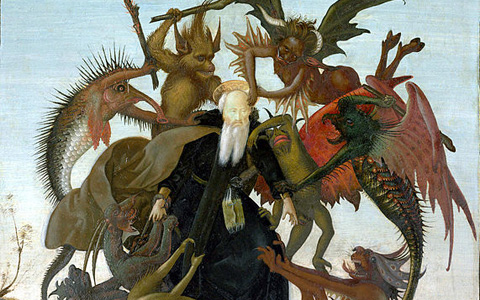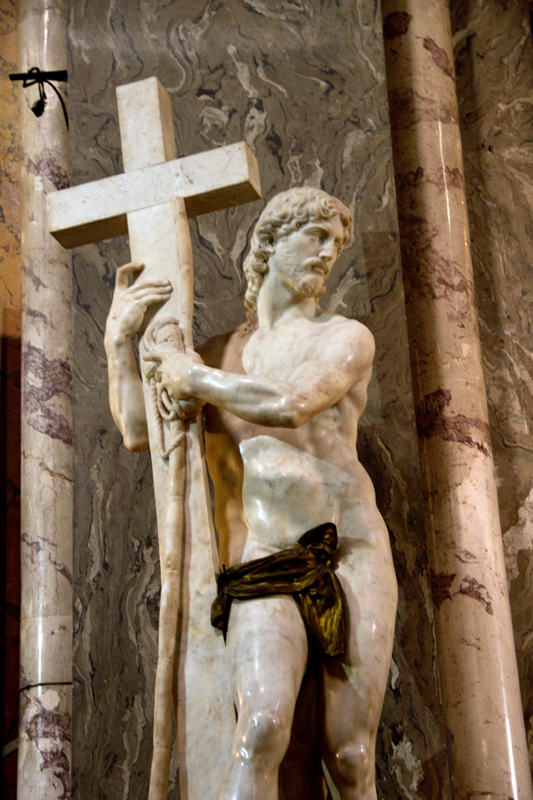I know what intelligent actions involve-prayer, reflection, rational discourse, using the gifts of the Holy Spirit given in confirmation, getting advice from a spiritual director, reading, studying the Faith, doing penance.
Intelligence involves the entire person being focused on using the gifts at hand to learn the Faith and use it daily.
We are all made in the image and likeness of God, and the intellectual gift of thinking and decision making using will power-the will being one way we are like God, the other being our freedom and the third, which is the likeness, is grace.
I have written much on grace, so follow the tags, but using one's intellectual capacity to the fullest potential defines being human.
So, what makes people stupid and what does it mean to be stupid?
Second definition first-stupidity is dullness of mind, ignorance, and even obtuse, or stubbornness.
What makes people freely chose to be dull, ignorant and stubborn is, simply, sin.
Stupidity grows out of many sins, in fact, and here is an incomplete list:
lust
sloth
greed
anger
pride
gluttony
envy.....
I hope you recognize these as the seven deadly sins.
Lust consumes the imagination with false idolatry, thus making people dull of mind. Intemperance of thought, such as curiosity, and the chasing of emotional religious experience, are rooted in lust.
Sloth stops growth, makes one give up on holiness and ignores the virtue of studiosity.
Greed consumes one with false gods of money, things, status, power, making one into a beast instead of a thinking human being.
Anger brings about unforgiveness, rash judgements, prejudices, and intemperance, allowing the mind to dwell upon real or imagined hurts.
Pride creates an entire false world by which a person judges everything but themselves. Pride also dulls the mind, the soul, one's conscience.
Gluttony absolutely makes one stupid, as intemperance in food and drink slow down the thought processes and make a person dwell on satisfaction and comfort rather than study or reflection. Those who spend too much time on eating and drinking have little time or inclination for study.
Envy stops mental acuity by causing a person to dwell upon what others have and what others do. Envy causes shallow thinking and gossip, leading a person away from reflection and prayer.
I add fear to this list, as fear deadens the intellect. Fear makes a person fall back into the morass of negative emotions, protection, paranoia and self-preservation, all which stop intellectual growth.
Sin causes stupidity. Not facing and eliminating one's predominant fault causes stupidity. Refusing to follow the wisdom of the ages of Church guidance regarding holiness causes stupidity.
Wanting one's own way over and over and over is just plain stupid.
I incorporate the ideas of an old post to reveal how one can break out of stupidity. Humility is the answer.
Sunday, 22 July 2012
Perfection Series: Our Predominant Fault Two
show that the Medievals were being taught what we moderns have forgotten--that sin binds us to
Satan and death.
Garrigou-Lagrange states that "it is of primary importance that we recognize our predominant
Garrigou-Lagrange states that "it is of primary importance that we recognize our predominant
fault and have no illusions about it. This is is so much the more necessary as our adversary, the
enemy of our soul, knows it quite well and makes use of it to stir up trouble in and about us. In the
citadel of our interior life, which is defended by the different virtues, the predominant fault is the weak spot, undefended by the theological and moral virtues."
On this picture above, Envy and Pride are depicted.
Most of the characters have chains.
Many times we forget who is out to claim us for hell.
Lust and Sloth (who has beads) point to the need for deep, persistent prayer, as do all the other Deadly Sins. Garrigou-Lagrange writes that we must ask God, seek Him, for enlightenment as to one's predominant fault. We must ask him to remove the fault, help us to cooperate with Him is purification. We must be serious about our personal daily examinations of conscience.
What is really tricky is that the fault may seem like a virtue.
He gives us these questions to ask ourselves: "Toward what do my most ordinary preoccupations
Many times we forget who is out to claim us for hell.
Lust and Sloth (who has beads) point to the need for deep, persistent prayer, as do all the other Deadly Sins. Garrigou-Lagrange writes that we must ask God, seek Him, for enlightenment as to one's predominant fault. We must ask him to remove the fault, help us to cooperate with Him is purification. We must be serious about our personal daily examinations of conscience.
What is really tricky is that the fault may seem like a virtue.
He gives us these questions to ask ourselves: "Toward what do my most ordinary preoccupations
tend, in the morning when I awake, or when I am alone? Where do my thoughts and desires go spontaneously?"
For the sake of our souls, we must be brutally honest with ourselves.
Here is a great question from the Dominican: "What is generally the cause or source of my sadness and joy? What is the general motive of my action, the ordinary origin of my sins...a succession of sins or a state of resistance to grace, notably when this resistance persists for several days and leads me to omit my exercises of piety?" On the right, we see Violence and Gluttony. I would think that Gluttony is one of the most prevalent of the Deadly Sins in the West. That Violence is obvious in certain countries indicates certain people have this fundamental, predominant sin.
If we deny something which someone else points out, it is probably our dominant fault fighting to
For the sake of our souls, we must be brutally honest with ourselves.
Here is a great question from the Dominican: "What is generally the cause or source of my sadness and joy? What is the general motive of my action, the ordinary origin of my sins...a succession of sins or a state of resistance to grace, notably when this resistance persists for several days and leads me to omit my exercises of piety?" On the right, we see Violence and Gluttony. I would think that Gluttony is one of the most prevalent of the Deadly Sins in the West. That Violence is obvious in certain countries indicates certain people have this fundamental, predominant sin.
If we deny something which someone else points out, it is probably our dominant fault fighting to
remain hidden to our consciousness. We need grace. We need God.
Satan watches us. He hears us speak. He knows our predominant fault and uses temptations to lead
Satan watches us. He hears us speak. He knows our predominant fault and uses temptations to lead
us to yet another sin. And, here is the big point, quoting St. John 8:34, made by Garrigou-Lagrange.
"Whosoever committeth sin
"Whosoever committeth sin
is the servant of sin."
Also, quoting Thomas Aquinas,
Also, quoting Thomas Aquinas,
the author states "Every man
judges of what is good according to his good or evil interior dispositions."
The good priest gives us the example of how the predominant fault becomes our greatest virtue. He shows the text revealing the anger and vengeance of St. John, who later in life, wrote the most beautiful passages on love.
The good priest gives us the example of how the predominant fault becomes our greatest virtue. He shows the text revealing the anger and vengeance of St. John, who later in life, wrote the most beautiful passages on love.
The "son of anger" became the
poet and apostle of love. Wrath and Avarice on the right from Newark show contorted souls. Notice
again the chains.
We have much work to do. Let us pray for good spiritual directors, holy wives and husbands, excellent companions in monasteries and convents, and holy friends to point out our worst flaw and to work on
We have much work to do. Let us pray for good spiritual directors, holy wives and husbands, excellent companions in monasteries and convents, and holy friends to point out our worst flaw and to work on
the remedy.
For the sake of our souls...to be continued.
For the sake of our souls...to be continued.

.JPG)



.jpg)







